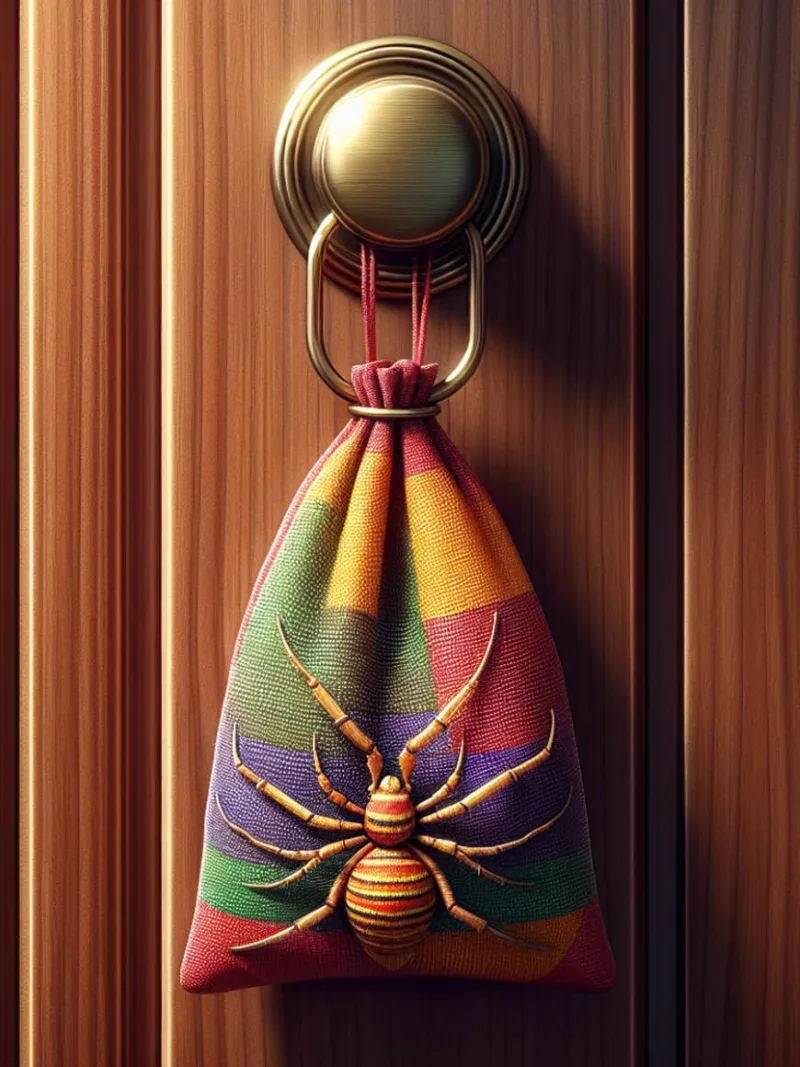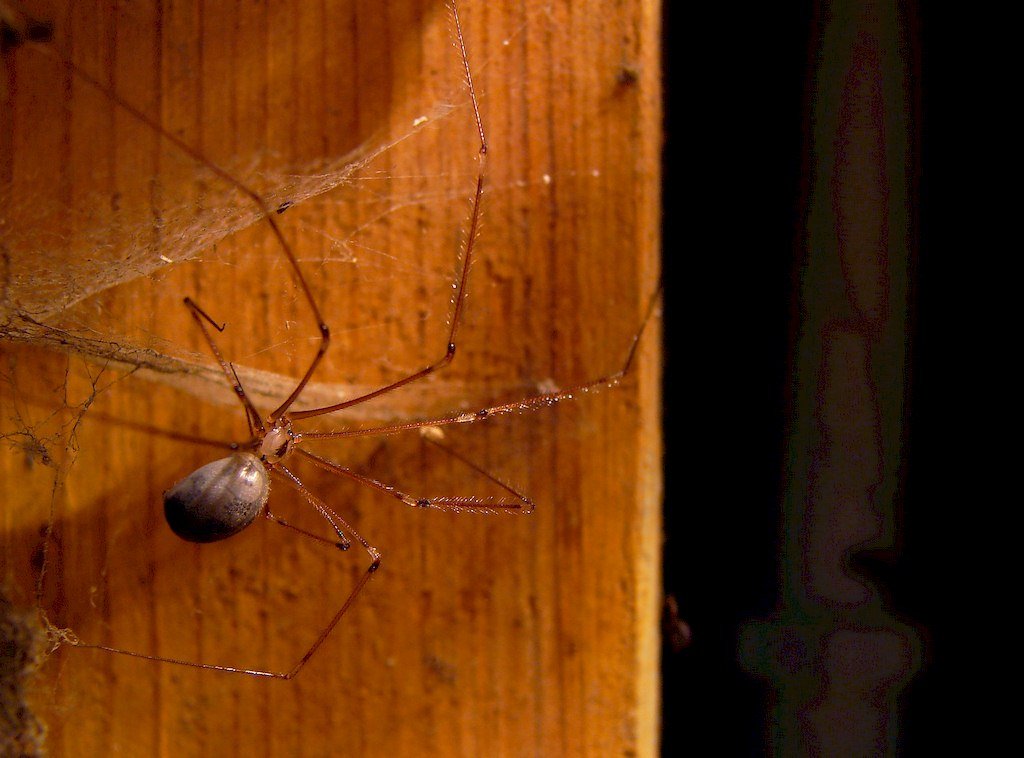Table of Contents Show
Imagine opening your wardrobe door to grab the beautiful blouse you wished to wear to the party, hoping for the right chance and you see a tiny creature on your favorite blouse and you just SCREAM.
It’s the last thing you’d ever want to see – a spider lurking around the closet.
You run to find the insecticide, trip on the hanger lying on the floor, and get hurt. Party’s over or… Game over. Spider 1, You 0.
So, here are all the easiest ways you need to bring in use for keeping spiders or the hurt away.

1. Keep the Insects Away
Spiders are usually drawn to places where they find insects such as flies, which are a primary source of food for them. To prevent an infestation, make sure there aren’t any flies in your room and more importantly, in your wardrobe.
Here are some practical tips to help keep insects at bay:
- Seal Entry Points: Ensure that windows and doors are properly sealed to prevent insects from entering your home. Use weather stripping or caulk to close any gaps.
- Clean Regularly: Maintain cleanliness by vacuuming and dusting frequently. Insects thrive in dirty environments, so keeping your wardrobe and surrounding areas tidy can significantly reduce their presence.
- Use Fly Screens: Install fly screens on windows and doors to keep flies out while still allowing fresh air to circulate.
- Proper Food Storage: Avoid leaving food out in the open. Store food in airtight containers to prevent attracting flies and other insects.
- Dispose of Garbage Properly: Regularly empty trash cans and use bins with tight-fitting lids to minimize the likelihood of attracting pests.
By following these steps, you can create an environment that is less inviting to insects, thereby reducing the chances of spiders making a home in your wardrobe.
2. Peppermint Oil
Peppermint oil has a very strong odor that spiders and many insects hate. This makes it an effective and natural repellent for your wardrobe. Here’s how you can use peppermint oil to keep your wardrobe free from unwanted pests:
- Soak Cotton Balls: Saturate several cotton balls with peppermint oil. You can find peppermint oil at most health stores or online.
- Placement: Place the soaked cotton balls strategically in the corners of your wardrobe, making sure to focus on areas where spiders are likely to enter or hide.
- Refresh Regularly: The scent of peppermint oil fades over time. To maintain its effectiveness, replace the cotton balls with freshly soaked ones every few weeks.
Additional Tips:
- Peppermint Spray: If you prefer, create a peppermint spray by mixing 10-15 drops of peppermint oil with water in a spray bottle. Lightly mist the interior surfaces of your wardrobe.
- Combine With Other Oils: For enhanced effectiveness, consider combining peppermint oil with other essential oils like eucalyptus or tea tree oil, which also have insect-repelling properties.
- Check for Sensitivities: Before using any essential oils, ensure that you and your household members are not sensitive or allergic to them.
By incorporating these simple steps, you can leverage the natural repellent properties of peppermint oil to keep your wardrobe fresh and pest-free.
3. Natural Spider Repellent
Seeing spiders in your wardrobe can be unsettling. Fortunately, you can create an effective DIY spider spray at home with a few simple ingredients:
- 1 cup vinegar
- 1 cup of pepper
- 1 teaspoon of oil
- Liquid soap
Instructions:
- Combine Ingredients: Mix the vinegar, pepper, oil, and liquid soap in a spray bottle.
- Shake Well: Ensure all ingredients are thoroughly mixed together.
- Spray Regularly: Apply this natural spider spray to the interior surfaces of your wardrobe as part of your regular pest control routine.
This homemade solution is both cost-effective and easy to prepare, making it a convenient option for keeping spiders at bay.
Ultrasonic Spider Repellent
In addition to DIY sprays, consider using an ultrasonic spider repellent. These devices emit high-frequency sound waves that are intolerable to spiders and other pests but inaudible to humans and pets.
Key Features:
- Non-toxic: Safe for use around children and pets.
- Low Maintenance: Simply plug it in and let it work continuously.
- Wide Coverage: Effective for large areas, ensuring comprehensive protection.
Where to Buy:
You can find ultrasonic spider repellents at most hardware stores or purchase them online for added convenience.
By integrating these natural and technological solutions into your pest control strategy, you can maintain a spider-free wardrobe effortlessly.
4. Use Citrus Peels
Just like mint, spiders hate the smell of anything citrus. This natural repellent is both effective and easy to use.
How to Use Citrus Peels:
- Choose Your Citrus: Opt for orange or lemon peels as they are particularly potent.
- Prepare the Peels: Cut the fruit and remove the peels, ensuring there is some of the white pith left, which helps retain their scent longer.
- Place in Bowls: Arrange the peels in small bowls or dishes and place them in your wardrobe.
Tip: You can also tuck some peels directly into pockets or shoes for added protection.
Maintenance:
- Replace Frequently: Replace the peels every 24 to 48 hours to maintain their potency as natural repellents.
- Check for Mold: Ensure that the peels do not develop mold, especially in humid environments, as this can affect their effectiveness and pose hygiene issues.
Additional Tips:
- Combine with Other Scents: Enhance effectiveness by combining citrus peels with other spider-repelling scents like eucalyptus or peppermint oils.
- Regular Rotation: Rotate the placement of the bowls to cover different areas of your wardrobe evenly.
By incorporating citrus peels into your pest control strategy, you can enjoy a fresh-smelling wardrobe while keeping spiders at bay naturally.
5. Baking Soda
Baking soda is a versatile household item that can also serve as an effective spider deterrent. Here’s how you can use it to keep your wardrobe spider-free:
1. Sprinkle in Corners
- Application: Take a spoonful of baking soda and sprinkle it into the corners of your wardrobe.
- Benefit: This will create a barrier that spiders are reluctant to cross, reducing their chances of making your wardrobe their home.
2. Window Sills and Doorways
- Application: Scatter small amounts of baking soda along window sills and doorways.
- Benefit: These entry points are common paths for spiders. By treating them with baking soda, you can prevent spiders from entering these areas.
3. Under Shelves
- Application: Dust some baking soda underneath shelves where shadows and hidden spaces attract spiders.
- Benefit: Spiders often seek out dark, undisturbed areas; treating these spots makes them less inviting.
Maintenance Tips
- Regular Reapplication: Refresh the baking soda every few weeks to maintain its effectiveness.
- Cleaning: During routine cleaning sessions, ensure to vacuum or wipe away old baking soda before applying a new layer.
Benefits of Using Baking Soda
- Non-toxic: Safe for households with pets and children.
- Odorless: Unlike some essential oils or vinegar, baking soda doesn’t leave behind any strong scents.
- Multi-Purpose: Can also help absorb moisture and odors in your wardrobe, providing dual benefits.
By integrating baking soda into your spider prevention routine, you can enjoy a cleaner, more pleasant-smelling wardrobe without unwelcome arachnid visitors.
6. Smelly Things
Spiders are highly averse to certain scents, which can be used to deter them from entering your space. Here are a few effective options:
1. Essential Oils: Scents such as eucalyptus, tea tree, and peppermint oils are particularly repellent to spiders. You can use these oils in several ways:
- Rubbing: Apply a few drops of essential oil onto a cloth and rub it around window frames, doorways, and other entry points.
- Misting: Create a spray by mixing a few drops of your chosen oil with water in a spray bottle. Mist this solution around potential spider hideouts.
2. Lemon Peel: Rub lemon peel around windowsills and door frames. The citrus scent is unpleasant for spiders and can act as a natural barrier.
3. Vinegar: Another scent that spiders dislike is vinegar. Incorporate it into your cleaning routine by:
- Spraying: Mix equal parts of white vinegar and water in a spray bottle. Spray this solution on surfaces where spiders are likely to crawl.
- Cleaning: Use vinegar-based solutions for mopping floors or wiping down counters to keep spiders at bay.
Additional Tips for Spider Prevention
1. Frequent Cleaning:
Regular cleaning helps eliminate the webs and egg sacs that may attract more spiders. Pay special attention to rarely-used items in your wardrobe, as these can become inviting homes for arachnids.
2. Handling Rarely Used Items:
Carefully inspect and clean items stored away for long periods. Shake out clothes, shoes, and bags before using them to ensure no spiders have made them their home.
3. Control Other Insects:
Spiders often enter homes in search of food, primarily other insects. By reducing the population of other insects within your home:
- Use insect repellents or traps to manage pests like flies, ants, and moths.
- Ensure food is properly sealed and crumbs are promptly cleaned to avoid attracting insects.
By incorporating these scented deterrents and maintaining regular cleaning practices, you can effectively reduce the likelihood of encountering spiders in your living spaces.
Conclusion
Taking a proactive approach to spider prevention can go a long way in ensuring a comfortable and arachnid-free living environment. From using natural deterrents like essential oils and vinegar, to implementing good cleaning habits and managing other insect populations, these simple steps can help keep spiders at bay. By adopting these practices, you can enjoy a spider-free home and the peace of mind that comes with it. So, don’t let those eight-legged creatures take over – take control and create a spider-proof zone!
FAQs (Frequently Asked Questions)
You can keep spiders out of your wardrobe by using natural spider repellents such as peppermint oil, citrus peels, and baking soda. Additionally, frequent cleaning, handling rarely used items, and controlling other insects in your home can help prevent spiders from entering your wardrobe.
You can use peppermint oil, citrus peels, and baking soda as natural spider repellents. These items have scents that spiders dislike and can help keep them away from your wardrobe.
Peppermint oil has a very strong odor that spiders and many insects dislike. You can create a peppermint spray to use in your wardrobe to deter spiders from entering the space.
In addition to using natural spider repellents, you can consider using an ultrasonic spider repellent, replacing citrus peels frequently, combining citrus peels with other scents, and regularly cleaning to eliminate webs and egg sacs.
You can use orange or lemon peels as a natural spider repellent. Place the peels in your wardrobe as the scent is disliked by spiders. It’s important to replace the peels every 24 to 48 hours for maximum effectiveness.
You can sprinkle baking soda in corners, on window sills and doorways, and underneath shelves in your wardrobe. Baking soda is non-toxic and safe for households with pets and children. Regular reapplication is necessary to maintain its effectiveness.










